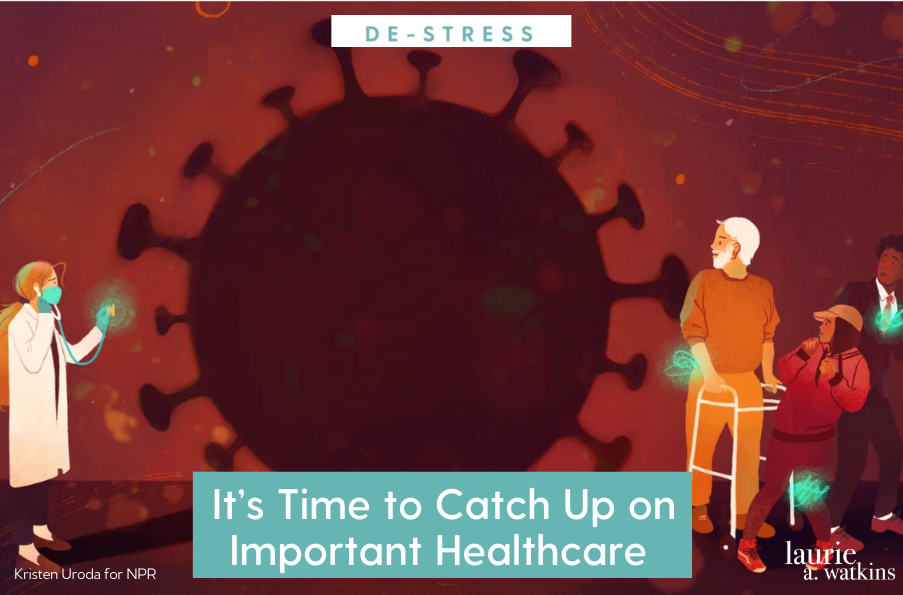When COVID-19 began, the vastly differing and rapidly changing information was incredibly overwhelming. For the last 14 months or longer, everyone has been focused on COVID-19. Living through a global pandemic can make everyone’s mindset shift and hyper-focus on the pandemic. However, it is not the time to neglect your regular doctor appointments.
Over the last year or more, many people have given up going to the dentist, have avoided eye exams, have passed on general physician appointments, seeing the OBGYN, skipped the dermatologist, and so much more. One area where there was an explosion in virtual appointments was in mental health and speaking to a therapist, which I fully support.
The time is ending for clinics and doctor’s offices to remain closed. Most medical offices are reopening or have been open for some time. Doctor’s offices have plenty of practices in place at this time to prevent the spread of COVID-19. Transmission is low at doctor’s offices and clinics because of these practices. Medical professionals know how to wear personal protective equipment better than anyone. Mask wearing and hand washing and social distancing are still a thing inside these establishments. So, it is definitely time to get back to your regularly scheduled appointments!
Evidence shows that the health threats from postponing some tests and exams — including those for cancer and heart disease, amongst many others too — outweigh the risk of running into the coronavirus at a doctor’s visit, even if the virus is still spreading in your community.
“A woman is more likely to die from an advanced-stage breast cancer than she is from COVID-19,” says Dr. Therese Bevers, medical director of the Cancer Prevention Center at the MD Anderson Cancer Center. Bevers says she worries that even with low COVID-19 transmission rates in health care facilities and encouragement to keep up with certain screenings and follow-up appointments, many people are still putting off those doctor visits — and suffering more as a result.
Some types of appointments you should certainly not avoid, or schedule right away if you have been avoiding them, include:
Cancer screenings. Routine screenings may have fallen off the calendar given the pandemic. However, when it comes to cancer, timing can be of the utmost importance when finding and fighting it. Those who have a family or personal history with cancer should not put off going in for your screening any longer. People may be diagnosed later, or with a more advanced stage, if not checked regularly.
Mental health exams. COVID-19 and the effects of the pandemic have put a strain on everyone’s mental health. There have been troubles with anger, loneliness, and so much more. Whether you have a long-standing relationship with a mental health professional, or have recently found yourself in need, mental health care is not one to avoid. The increase in depression, anxiety, and even substance abuse due to coronavirus needs to be addressed. Asking for help is a sign of strength, not a sign of weakness. Whether your mental health symptoms are new or long-standing, don’t continue to delay getting that help.
Sexual health maintenance. Some aspects of sexual health are preventative. However, if there is already a diagnosed issue, or a new issue arises, some diseases are curable and many are treatable. Unfortunately, COVID restrictions have made it more difficult for patients to get tested and treated for STDs. A shortage in routine testing supplies and a drop in the number of available clinic visits are to blame. People who are on HIV medications and those who are on certain types of birth control need to make it a priority to keep up with their appointments.
Follow-ups. If you have ever been diagnosed with a health condition, this is not the time to neglect your check-ups. The stress of the pandemic and work from home life or being an essential worker or dealing with unemployment or distance learning can bring on new illnesses or even worsen existing ones. 43% of patients with diabetes surveyed by the American Diabetes Association in December said they’ve delayed seeking routine medical care during the pandemic, often because of the fear of COVID-19. Some routine check-ups may be able to be done virtually with telehealth, but others must be done in person. Regardless, following-up on existing health conditions remains of the utmost importance.
Check-ins for new symptoms. Ignoring symptoms is not something we should be doing. New injuries still require physical therapy. Even with COVID being such a deadly pandemic, heart disease is still a leading killer in the United States. New heart health issues should be addressed as quickly as possible for monitoring. Of course, emergency services should still be called for any urgent onset of symptoms. However, things like shortness of breath or new headaches should be addressed with a healthcare provider.
Maternal and pediatric care. Pregnant women should still attend all their prenatal appointments. It is vital to the health of women and their babies that each appointment is attended during pregnancy. Even the appointments after the baby is born are important for mental health and postpartum health check ins. Additionally, it is important to take children to the pediatrician for their annual appointments as well. Whatever vaccination schedule you are on should be continued during this time. Many children have been taken out of their usual activities and routines. Having another trusted adult check in with children during this time is only a benefit.
Annual visits. Getting your eyes checked as part of your annual health is still crucial. Many of us will have changing needs for our eye care from an increase in screen time due to Zoom meetings. Heading to the dentist is also still a priority. We don’t want to re-enter the world with plaque on our teeth, or a mouth that’s full of cavities. Seeing your family practitioner is still a good idea during the pandemic as well. Getting your accurate weight and blood pressure readings, or maybe even having labs done, can help keep you healthy to avoid a bigger problem in the future.
Milestone tests. Things like colonoscopies and mammograms are another area of medicine that should not be neglected during the coronavirus spread. These types of tests can detect serious conditions that would be better to catch early. Don’t delay these tests!
Looking after your health is always a good idea. It is important to no longer delay any medical care or appointments you have put off. Obviously, you need to do your own risk assessment based on your own personal COVID-19 risk (and anyone you share space with), your vaccination status, and of course your own comfort. You can always ask for virtual/telehealth options.
What’s been happening with your physical and mental health during the pandemic? Have you had more in-person or virtual doctor visits? What appointments have you let fall off due to COVID-19?
I’d love to hear from you in the comments below.






